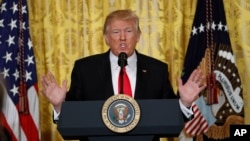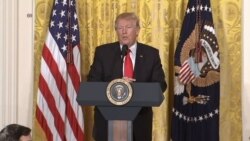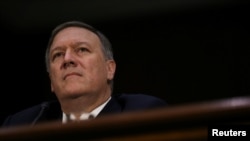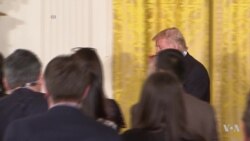Key U.S. intelligence agencies insist they will continue to provide President Donald Trump with “the best intelligence possible,” but there is growing concern among former officials and analysts that ties between the agencies and the White House are being strained like never before.
Fears of a deteriorating relationship were magnified Thursday, following a more than hourlong news conference during which Trump repeatedly promised to go after any official or analyst leaking information about his administration.
“I’ve gone to all of the folks in charge of the various agencies,” Trump told reporters. “It’s a criminal act.”
“I’ve actually called the Justice Department to look into the leaks,” he added.
Watch: Trump: Information Leaks are 'Criminal'
Media reports
Trump also shot down media reports that some agencies have been withholding critical intelligence from him, calling such reporting “disgraceful.”
He cited a statement from the Office of the Director of National Intelligence that was issued late Wednesday in response to a report by the Wall Street Journal.
“Any suggestion that the U.S. intelligence community is withholding information and not providing the best possible intelligence to the president and his national security team is not true,” the statement read.
Following the president’s news conference Thursday, the Central Intelligence Agency issued a statement of its own.
“The CIA does not, has not, and will never hide intelligence from the president, period,” it quoted CIA Director Mike Pompeo as saying. “We are not aware of any instance when that has occurred.”
Former intelligence officials and analysts who spoke with VOA agreed it was highly unlikely current officials would withhold critical information. Still, they said it is hard to imagine that the president’s, at times, combative rhetoric would be seen as anything but a swipe at the agencies and their employees.
“The current animosity is overriding,” said Paul Pillar, a veteran CIA officer now with the Center for Security Studies at Georgetown University.
Watch: Trump Defends Accomplishments, Attacks Media at Press Conference
Fractious relationship
Pillar said that while it would not be the first time there was “friction and ill will” between a president and the U.S. intelligence agencies, it was difficult to think of any precedence for the type of fractious relationship that has developed between Trump and members of the intelligence community.
“However much they have to hold their nose while doing their job, they’re going to do their job,” he said of the intelligence officers and analysts. But he warned concern about the president would linger.
“There are all kinds of doubts already,” Pillar cautioned. “We’ve passed that point long ago.”
Pillar and others say ongoing talk of the need to reform and possibly streamline the U.S. intelligence community is likely not helping. And officials say there has been talk of possibly bringing in an outsider to help, including private equity billionaire, Cerberus CEO Stephen Feinberg.
On Thursday, the president denied reports he was planning to bring in Feinberg to lead the charge, though he declined to completely rule out some role.
“I think that we are going to be able to straighten it out without using anybody else,” Trump said, adding Feinberg “is a very talented man, very successful man and he’s offered his services and it’s something we may take advantage of.”
Even if such an effort is not in the works for now, there are fears the administration may be embarking on a potentially dangerous path.
“They could politicize the way that the intelligence community does their jobs,” said Nada Bakos, a former CIA analyst and senior fellow at the Foreign Policy Research Institute.
“They could silence portions of it that they don’t trust or feel are continuing to toe their view or ideology and amplify others that they think just agree with them,” Bakos said. “We’ve been down this road before and it gets us into a lot of trouble.”
Conflict over Russia
Yet even without a potential overhaul or reformation, other issues continue to eat away at the relationship between Trump and the country’s key intelligence agencies, none more so than Russia.
“It’s not unusual for an administration to have tensions with the agency [CIA] or intelligence community over a specific incident,” former intelligence officer Patrick Skinner said. “It’s unheard of for there to be this kind of warfare not over an issue but an entire systemic long-running issue like Russia and disinformation.”
In a January 6 report, the U.S. intelligence community assessed with “high confidence” Russian President Vladimir Putin ordered an influence campaign designed to “to undermine public faith in the U.S. democratic process.” The report also concluded that during the presidential campaign, Russia developed a preference for then-candidate Trump and aspired to help him win.
After repeatedly criticizing that assessment before taking office, President Trump took aim at the assessment again during his news conference, describing it as “fake news.”
“The whole Russian thing, that’s a ruse. That’s a ruse,” he said. “You can talk all you want about Russia, which was fake news, fabricated deal, to try and make up for the loss of the Democrats.”
Skinner, who now works with the Soufan Group, a provider of strategic security intelligence services, called such open disdain for the intelligence agencies’ finding unprecedented and dangerous.
“These statements have real world consequences,” he said. “Keep saying that the IC [intelligence community] is basically evil and policies and votes and worse happen.”
WikiLeaks
Other former members of the U.S. intelligence community also questioned Trump’s defense of WikiLeaks, an anti-secrecy group that has released leaked U.S. diplomatic cables and other classified material on its website.
“That is beyond comprehension,” said former CIA analyst Aki Peritz, now a senior fellow at George Washington University’s Center for Cyber and Homeland Security.
During the U.S. presidential campaign, WikiLeaks also released emails stolen from the Democratic National Committee regarding Democratic Party candidate Hillary Clinton.
In its report earlier this year, U.S. intelligence concluded with “high confidence” that after hacking into the emails, Russian military intelligence “relayed material it acquired from the DNC and senior Democratic officials to WikiLeaks.”
“Our entire system of government runs on trust, and if the trust between the president and the intelligence community declines, the whole system starts falling apart,” said Peritz, warning it could leave the U.S. vulnerable.
“When you see a real break down occurring like I think we’re seeing right now, maybe our adversaries can take advantage of that or maybe they can’t, but it gives them an opportunity,” he said.
VOA’s Aru Pande contributed to this report.









